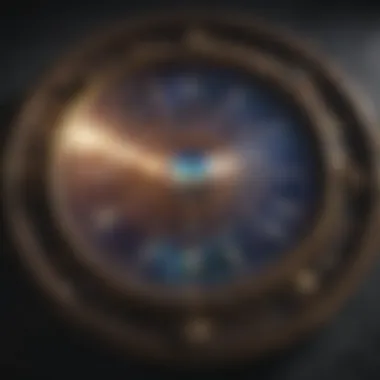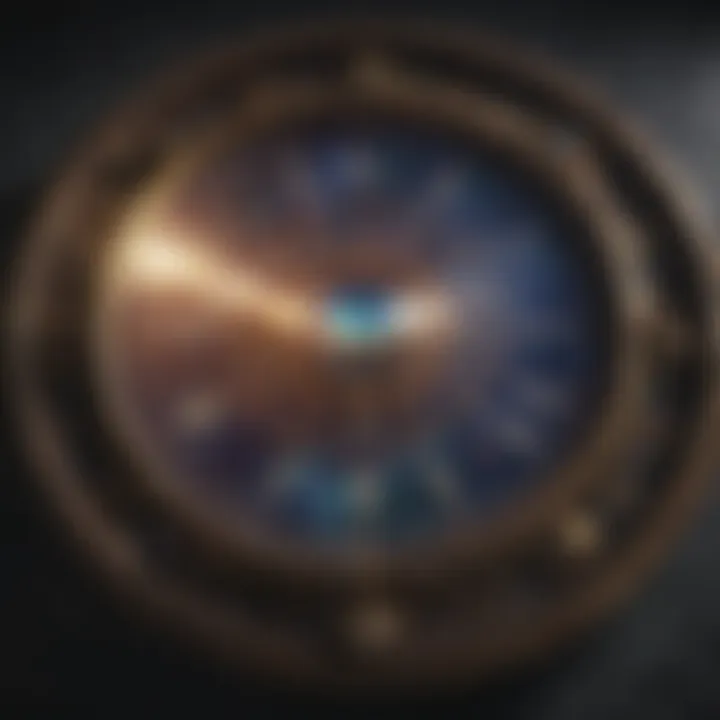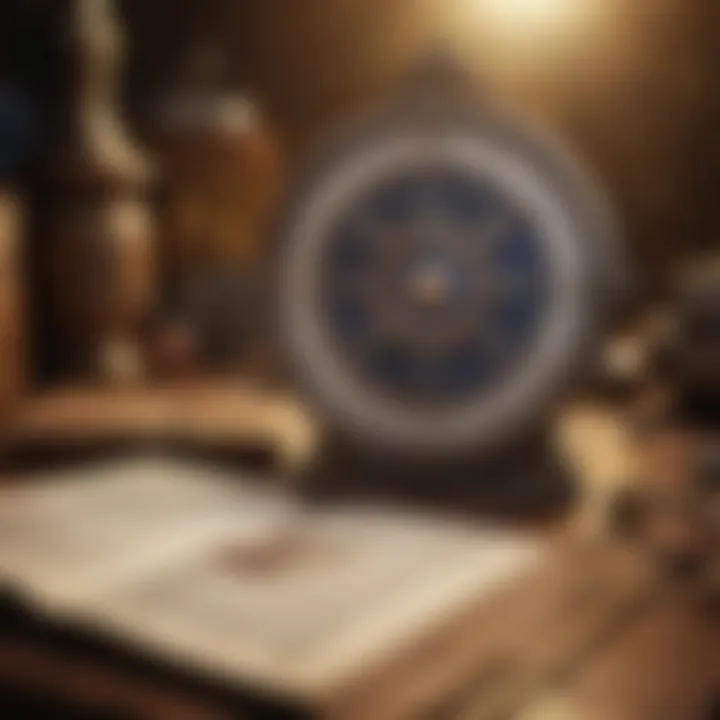Exploring the Meaning of Personal Horoscope Books


Intro
The fascination with astrology runs deep, threading through cultures and centuries, capturing the imagination of many. Personal horoscope books stand at the forefront of this complex tapestry, offering insights tailored to individual experiences. But what really makes these books tick? Exploring the ins and outs of personal horoscope books reveals not only their charm but also their purpose. They serve as portals for self-discovery, fostering a profound understanding of oneself through astrological frameworks.
As we navigate through these pages, we find ourselves in a world where the movements of the heavens intersect with our daily lives. The mystique of the zodiac lies within its symbols, each holding the key to unveiling the narrative of our existence. Whether one is a seasoned astrologer or just stepping into the realm of the stars, the journey of understanding horoscopes is as intricate as a spider's web.
Understanding the Zodiac
Overview of Zodiac Signs
The zodiac is divided into twelve distinct signs, one for each month of the year, each bearing unique traits and stories. From Aries, known for its fiery spirit, to Pisces, with its dreamy and intuitive nature, every sign contributes to a much larger cosmic picture. These signs not only represent individual characteristics, but they also interact with one another, influencing relationships and personal experiences.
Sign Traits and Characteristics
Every zodiac sign has its own personality. Here’s a closer look at a few:
- Aries: Bold, ambitious, and straightforward.
- Taurus: Reliable, practical, loves comfort.
- Gemini: Curious, adaptable, and sociable.
- Cancer: Nurturing, sensitive, protective of loved ones.
These traits shape how we see the world and influence our reactions to various situations. Despite their individual strengths and weaknesses, together they form a complete tapestry of human experience.
Elemental Qualities
The zodiac signs are also divided into four elements: Fire, Earth, Air, and Water. Each sign resonates with one of these elements, contributing different dimensions to its personality:
- Fire Signs (Aries, Leo, Sagittarius): They embody passion and energy.
- Earth Signs (Taurus, Virgo, Capricorn): They bring practicality and stability.
- Air Signs (Gemini, Libra, Aquarius): They reflect intellect and communication.
- Water Signs (Cancer, Scorpio, Pisces): They are intuitive and emotional.
Understanding these elemental qualities provides a clearer lens through which to view ourselves and others. Armed with this knowledge, personal horoscope books can guide readers in understanding their unique attributes and how to harness them for growth.
Astrological Insights
Current Astrological Trends
Keeping an eye on current trends in astrology can prove beneficial. These trends can influence personal experiences, and many astrologers compile these insights into accessible formats, often found within personal horoscope books. It’s like having a cosmic weather report at your fingertips.
Influence of Celestial Events
Celestial bodies impact our lives in subtle ways. For instance, a Mercury retrograde can induce communication mishaps or sow confusion. Personal horoscope books often detail these effects, helping individuals prepare and navigate through potentially challenging periods. Celestial events such as eclipses also hold significant meaning, often nudging us toward making crucial life decisions. Understanding how these events correlate to personal zodiac signs can provide clarity during turbulent times.
How to Interpret Your Birth Chart
Your birth chart acts as a snapshot of the sky at your moment of birth. Each planet's position signifies different facets of personality and life events. Learning to interpret this chart can feel daunting, but personal horoscope books simplify this process:
- Identify the Ascendant: This governs how others perceive you.
- Explore the Sun and Moon Signs: These represent your core self and emotional framework.
- Study Planetary Aspects: Understanding the angles between planets reveals deeper interactions and themes.
Recognizing these elements allows readers to engage more intimately with their astrological narratives.
Horoscope and Predictions
Monthly or Weekly Forecasts
Personal horoscopes regularly provide monthly or weekly forecasts, guiding individuals through what lies ahead. These forecasts can be exceptionally illuminating, offering foresight into what to expect during a given time frame. It's as if you’re getting a leg up on the universe’s master plan for you.
Personalized Horoscope Reading
A personalized horoscope reading offers insights that are particularly meaningful to the individual. This may involve diving deeper into personal experiences and emotional landscapes based on the zodiac sign's attributes.
Compatibility Readings based on Zodiac signs
Understanding compatibility through zodiac signs can provide valuable insights into relationships. Certain signs mesh well together while others might create friction. Compatibility readings can shed light on the dynamics at play in personal relationships, revealing pathways for understanding and harmony.
"Astrology is a language. If you understand this language, the sky speaks to you." - Dane Rudhyar
Prelude to Personal Horoscope Books
Personal horoscope books serve as intricate compasses guiding individuals through the cosmic landscape of their lives. These texts go beyond mere daily predictions; they provide a personalized exploration into one’s character traits, potentials, challenges, and even relationships. The importance of such books lies not only in their versatility but also in their ability to make the complex, often esoteric, system of astrology into something tangible and relatable.
Understanding Horoscopes
Horoscopes, essentially, are the blueprints drawn from the celestial positions at the time of one’s birth. Each individual is believed to carry a unique set of characteristics that align with specific zodiac signs and planetary influences. By understanding how these elements intertwine, people gain insights into their behavioral patterns, strengths, and areas where they might sometimes trip over their own shoes.
For example, let’s say someone has a Gemini sun sign. They might find that their intrinsic curiosity often gets them into various situations and relationships. However, this same quality can lead to a knack for effective communication, a true gem for networking and building relationships. This duality is what keeps the study of horoscopes endlessly fascinating.
Purpose of Personal Horoscope Books
The primary purpose of personal horoscope books is to offer tailored astrological insights that can resonate deeply on an individual level. While daily horoscopes present a general overview, these books dive into the specifics—highlighting how celestial movements affect personal traits or life events. It’s much like opening a treasure chest filled with specifically curated gems, each representing a different facet of one’s personality.


- Self-Discovery: They act as mirrors, reflecting who we are and where we might be headed. This can be liberating and illuminating, helping individuals navigate their personal journeys with a tad more confidence.
- Guidance: In times of uncertainty, these books can provide much-needed context, letting individuals know they are not adrift amongst the stars but are rather moving through a cosmic pathway designed just for them.
- Empowerment: The more one learns about the planets and their positions, the better equipped one is to make choices that align with their personal truths.
"Astrology is a language. If you understand this language, the sky speaks to you." - Dane Rudhyar
In a world fraught with noise and confusion, personal horoscope books articulate a more profound understanding of the self. They invite readers to dig deeper, to explore not just what lies ahead, but also to introspect on who they truly are—an endeavor worth pursuing in any age.
Historical Context of Astrology
The historical context of astrology serves as a crucial foundation for understanding personal horoscope books. By exploring how astrology has evolved over centuries, we gain insight into its significance in contemporary practices, such as personal horoscopes. Recognizing the historical significance helps astrologers appreciate the rich narrative that intertwines mythology, astronomy, and cultural practices. It also underscores the benefits of studying astrology, as it illuminates pathways to self-awareness, allowing individuals to engage more deeply with their personal narratives.
Astrology Through the Ages
Astrology's journey begins in ancient civilizations like Babylon and Egypt. These cultures regarded the movements of celestial bodies not merely as observations but as instruments guiding human affairs. Babylonians, around the 2nd millennium BCE, formulated one of the earliest known zodiac systems, aligning astrological signs with lunar cycles. This set the stage for future astrological frameworks.
Fast forward to ancient Greece. Here, astrological thought intertwined with philosophy and science. Figures like Ptolemy and Hippocrates contributed substantially, lending a rational angle to celestial observations. They merged astrology with comprehensive medical practices, considering the influence of planets on health. This philosophical blending nurtured a fertile ground for personal horoscope interpretation, paving the way for individual-centric astrology.
Not to be left behind, the growth of astrology in India, or Jyotisha, added layers of depth. Indian astrology embraced a cosmic perspective, emphasizing karmic cycles and spiritual growth. As texts like the Brihat Parashara Hora Shastra emerged, the idea of personal horoscopes took root, illustrating how planetary positions at the time of birth can reveal individual destinies.
Over the centuries, astrology faced scrutiny, especially during the Enlightenment. Critics like Rene Descartes influenced a shift towards empiricism, sidelining astrology in favor of scientific methodologies. However, the 20th century saw a renaissance. Writers and thinkers began re-examining ancient texts, rekindling interest in astrology. Today, it stands tall alongside modern psychological theories, with many linking their works to personal growth and inner exploration.
Thus, this historical lens provides a rich tapestry from which personal horoscopes can be viewed, revealing not only individual paths but also a collective human experience shaped by celestial forces.
Evolution of Personal Horoscopes
The evolution of personal horoscopes is a fascinating tale that mirrors society's shifting values and beliefs. Initially, horoscopes were broad brushstrokes applied to entire populations. As comprehension of celestial influences grew, a more tailored approach emerged.
In the medieval period, horoscopes began to reflect individualized interpretations based on the time and place of birth. Astrologers started creating natal charts, which are unique snapshots of the sky, offering insight into a person's character and life path. The invention of the telescope and advancements in astronomy further refined these methods, enhancing the accuracy of predictions.
Today, personal horoscope books have evolved into expansive guides that cover an array of themes. With the availability of astrological software, anyone can generate their own horoscope with relative ease. However, the art lies not merely in the data but in the interpretation. The depth of personal horoscopes is enriched by narrative and intuition, allowing for a profound connection between reader and text.
As we navigate through the modern astrological landscape, the emphasis on personal experience continues to gain traction. This enables individuals to use astrology as a way to reflect on their lives, fostering a sense of agency in the tapestry of existence.
"Astrology is a bridge between the stars and individual experience, unraveling the mysteries that shape our journeys."
Components of Personal Horoscope Books
In the realm of personal horoscope books, understanding their components offers a window into the very fabric of astrological interpretation. These books function not only as guides but as mirrors reflecting an individual's traits, tendencies, and potential life paths. Understanding the core elements—zodiac signs, planets, and houses—enables readers to harness the wisdom of astrology, aiding in personal growth and self-discovery. Let's dive into the foundational components.
Zodiac Signs and Their Meanings
The zodiac signs are often seen as the heart of astrology, each sign possessing its own unique characteristics and narratives. There are twelve zodiac signs, each one said to offer insights into specific personality traits. For instance, an Aries might be perceived as bold and passionate, while a Cancer is often viewed as nurturing and sensitive.
Recognizing these meanings can empower individuals to reflect on their personalities. Knowing one's sun sign could lead to a deeper understanding of oneself and others. It doesn't stop there; each sign also corresponds to elements—fire, earth, air, and water—further enriching the interpretation. Here’s a quick look at some signs:
- Aries: Energetic and ambitious.
- Taurus: Grounded and reliable.
- Gemini: Inquisitive and adaptive.
- Leo: Charismatic and creative.
- Scorpio: Intense and mysterious.
- Aquarius: Innovative and individualistic.
This comprehension of zodiac signs cultivates awareness and encourages introspection, which can be particularly valuable in decision-making processes or navigating relationships.
Planets and Their Influence
Moving beyond the signs, planets serve as the actors in the celestial play of astrological interpretation, influencing how the energy of each sign is expressed. Each planet carries with it specific meanings and rulerships.
For example, Mars governs ambition and drive, while Venus shines a light on love and beauty. The positioning of these planets at the time of an individual’s birth may hold sway over their inclinations and life experiences. Having knowledge of which planets affect which signs can help in gaining a nuanced perspective.
- Sun: Vitality and core identity.
- Moon: Emotions and inner life.
- Mercury: Communication and intellect.
- Jupiter: Expansion and abundance.
- Saturn: Discipline and responsibility.
Understanding these planetary influences isn't merely academic; it can be life-changing. By navigating through these celestial maps, individuals learn to adapt their actions and thoughts in line with the planetary rhythms.
Houses and Their Significance
Astrology also employs a system of twelve houses, each representing different areas of life such as career, relationships, and personal development. The houses provide a framework for where the energy of the signs and planets manifests in an individual’s life.
Imagine a pie chart divided into equal sections; each slice tells a story about a distinct aspect of existence.
The First House focuses on self-image and personal identity, while the Seventh House concerns partnerships and relationships. Here’s a brief overview of some key houses:
- First House: Self and appearance.
- Fourth House: Home and family.
- Tenth House: Career and reputation.
- Twelfth House: Spirituality and the subconscious.
By mapping out one's astrological chart using these houses, individuals can uncover areas of challenge and opportunity in their lives. This insight is crucial when it comes to setting goals, resolving conflicts, or fostering personal growth.
"Understanding your personal horoscope is like having a roadmap to navigate life’s complex pathways."
In essence, the components of personal horoscope books are intricately interwoven, creating a multifaceted narrative for self-exploration. Whether you are a seasoned astrologer or a curious newcomer, unraveling these elements equips you to better understand not just your own life, but the astrological influences that may steer your decisions and interactions.
Types of Personal Horoscope Books
In the realm of astrology, personal horoscope books serve as essential tools for individuals seeking to navigate their life's journey. The launch point for exploration involves understanding the types of these books, each catering to different needs and interests of the reader. The diversity in personal horoscope books presents a treasure trove of insights, allowing users to delve into distinct pathways of self-discovery and personal growth. Assessing the various types of personal horoscope books reveals their unique benefits, and understanding these can help one select a book that truly resonates with their astrological pursuits.


General Horoscope Books
General horoscope books typically provide a broad overview of the astrological signs, planetary influences, and predictions. These texts are often compiled for mass consumption and are structured to be accessible to a wide audience. They feature:
- Basic character traits associated with each zodiac sign
- Monthly or yearly forecasts that highlight key astrological events
- Simplified explanations of astrological concepts like houses and aspects
The strength of general horoscope books lies in their comprehensiveness. They serve as excellent starting points for beginners who might not yet be deeply familiar with the language of astrology. However, they can sometimes lack the specificity one might seek for nuanced personal insights.
Customized Astrology Readings
Customized astrology readings go a step beyond general books, offering tailored insights based on an individual's unique birth chart. These readings require specific information, such as:
- Date of birth
- Time of birth
- Location of birth
With this data, astrologers can craft personalized interpretations that reflect the complexities of an individual’s personality and life path. Customized readings often delve into:
- Strengths and weaknesses derived from planetary placements
- Challenges and opportunities based on current astrological transits
- Personalized advice for growth and self-awareness
The allure of these readings lies in their individual focus. They resonate with those seeking not just knowledge but actionable insights that can guide decisions and personal development.
Astrology Compendiums
Astrology compendiums represent the culmination of extensive astrological knowledge, combining various elements from general information and customized readings into one comprehensive volume. These books often include:
- In-depth analyses of zodiac signs, planets, and houses
- Case studies and examples illustrating astrological principles in action
- Resources for further study, like historical perspectives or philosophical approaches to astrology
Although they may not provide the immediacy of a custom reading, astrology compendiums serve as invaluable reference materials for advanced practitioners and learners alike. They encourage deeper dives into concepts that can enrich one’s understanding of astrology's vast landscape.
In essence, choosing the right type of personal horoscope book is crucial in one’s astrological journey. By understanding the different formats available—ranging from general overviews to tailored insights—readers can select the tools that best fit their needs.
The rich tapestry of personal horoscope books thus offers pathways for both new and seasoned seekers to explore their astrological selves.
Crafting a Personal Horoscope
Creating a personal horoscope is not merely about flipping through the pages of a book or inputting numbers into a software program. It’s about connecting the dots between celestial movements and the unique traits that shape an individual’s earthly experience. A personal horoscope provides insights that can shed light on one’s personality, relationships, and life path. When approached thoughtfully, it becomes an invaluable tool for personal growth and self-understanding.
Gathering Birth Information
The foundation of an accurate personal horoscope relies heavily on the specifics of one’s birth information. This includes not only the date of birth but also the exact time and location. These details are crucial as they inform the astrological calculations that ultimately depict one's chart.
- Date: The day, month, and year offer the primary framework for understanding one's astrological placements, corresponding to the twelve zodiac signs.
- Time: An accurate birth time is vital. Even a discrepancy of a few minutes can alter the rising sign, which plays a significant role in defining personality traits and how one interacts with the world.
- Location: The birthplace affects the positioning of houses in the chart, affecting the interpretation of various planetary influences.
Collectively, these elements help astrologers build a birth chart that serves as a cosmic snapshot at the moment of an individual's arrival.
Using Astrological Software
In contemporary astrology, digital tools simplify the process of crafting personal horoscopes. Astrological software can calculate the various positions and aspects of planets quickly and accurately. Some popular programs include AstroGold and Solar Fire, which offer in-depth features.
Advantages of astrological software include:
- Speed and Efficiency: What once took hours of manual calculations can now be done in a matter of seconds.
- Comprehensive Data: Users gain access to a wealth of astrological data that might otherwise be overwhelming to interpret manually.
- Customization Options: Many software platforms allow for adjustments and personalized settings that can cater to specific needs, whether that’s a focus on relationships or career insights.
Thus, using technology in astrological practices not only modernizes the field but also enhances the depth of analysis available to enthusiasts and practitioners alike.
Interpreting Astrological Data
Once the birth chart is created, the challenge shifts to the interpretation of the data. Astrology enthusiasts must sift through various components—like planetary alignments, aspects, and houses—to unravel insights that possess personal relevance.
Key elements to focus on include:
- Planetary Transits: Understanding how current planetary movements interact with natal planets can shed light on forthcoming influences.
- Aspects: These reveal how different planets in your chart communicate with each other, denoting strengths and challenges. For instance, a harmonious trine may indicate an ease in certain areas of life, while a square could signal obstacles.
- Houses: Each house represents different areas of life, from career to relationships. Recognizing where the planets reside helps to focus interpretations on specific life domains.
Astrological interpretation is not a one-size-fits-all scenario; it requires intuition, experience, and a keen understanding of one's own life experiences. This interpretive process is where much of the magic lies in crafting a personal horoscope, revealing paths for growth, understanding, and self-discovery.
"Astrology does not dictate your fate; rather, it empowers you with the knowledge of cycles and potentials, encouraging informed choices."
Understanding Astrological Interpretations
Astrological interpretations represent the bridge between the celestial patterns and human experiences. Understanding these interpretations is pivotal for anyone who seeks deeper insights into their personal horoscope. Unlike mere predictions, interpretations imbue an empathetic layer to astrological readings, tailoring cosmic narratives to individual experiences. This contextual understanding can be both enlightening and comforting, guiding individuals through life's increasingly complex pathways.
Personality Insights from Zodiac Signs
At the heart of astrological interpretations lies the zodiac signs, each brimming with distinctive traits and characteristics. For instance, those born under Aries are often seen as bold leaders, while Aquarians might exemplify an innovative spirit. This categorization helps individuals pinpoint their inherent strengths and weaknesses.
Understanding these traits is instrumental in self-reflection and recognition of one's unique path. These insights can shift perspectives, helping one harness their natural inclinations to navigate life's ups and downs.
"Astrology is a map of the human experience, guiding us through the maze of life with the stars as our compasses."
Compatibility Assessments


Compatibility in astrology goes beyond just romantic pairings; it touches on friendships, family ties, and professional relationships as well. By analyzing sun signs and their elemental relationships—fire, earth, air, and water— individuals can glean insights into their interpersonal dynamics.
For instance, a Sagittarius might feel more at home with a Leo, both being fire signs, yet may clash with a Taurus whose earthy nature contrasts sharply with theirs. Of course, this only scratches the surface—factors like rising signs and moon placements play pivotal roles in compatibility too.
Understanding this mosaic of influences can help individuals navigate their relationships more effectively, fostering harmony or addressing potential conflicts.
Growth and Guidance Theories
Astrological interpretations are not just about self-awareness or compatibility; they extend into the realms of personal growth and guidance. Each astrological event, be it a full moon, new moon, or planetary retrograde, carries magnetic energies that can influence personal development.
For instance, during a Mercury retrograde period, known for its communication snafus, one might find it challenging to articulate their thoughts. Recognizing this influence allows for proactive strategies, such as practicing patience or utilizing alternative communication methods.
In this sense, astrology becomes a tool for not just awareness but progression, guiding individuals toward the growth pathways that align with their cosmic blueprints.
In summary, understanding astrological interpretations offers a multifaceted lens through which individuals can explore their lives. With insights from zodiac signs, assessments of compatibility, and growth theories, one can craft a richer narrative of their existence, leading to more informed choices as they traverse through the vast universe.
Ethical Considerations in Astrology
In the vast tapestry of human experience, ethics can sometimes feel like an intricate pattern that threads through all actions and beliefs. When it comes to astrology, the ethical landscape is multidimensional, calling for a careful examination of how astrological insights can affect individual lives. This section aims to shed light on the significance of these ethical considerations in the context of personal horoscopes, emphasizing the responsibility that comes along with astrological knowledge.
Astrology vs. Determinism
One key aspect of the ethical discussion within astrology is the ongoing debate regarding determinism. This notion posits that events, including human actions, are ultimately determined by factors beyond one’s control. In the realm of astrology, this can translate to the belief that one’s fate is solely written in the stars—whereby individuals may feel they have no agency over their lives.
Educating clients or readers about the balance between astrological influences and personal agency is essential. Here, we encourage astrologers to foster an environment where clients can appreciate the guidance provided by their horoscopes but also recognize their capacity to make choices. By affirming that astrology offers insights and potential pathways rather than predetermined outcomes, practitioners can support clients in making informed life decisions.
"Astrology may provide insights, but understanding and agency always remain in the hands of the individual."
Respecting Personal Choices
In the world of personal horoscopes, respecting individual choices takes center stage. Each person's relationship with astrology varies significantly based on their cultural background, personal experiences, and beliefs. It's crucial for astrologers and writers of horoscope books to maintain a respectful approach to these variances.
A few vital considerations include:
- Framework Sensitivity: Acknowledge that different cultures interpret astrological symbols and meanings uniquely. Understanding this diversity can prevent imposition of one’s own beliefs onto another.
- Mindful Communication: Use language that empowers rather than disempowers. When providing readings, emphasize the client’s ability to choose their path and how tarot might be a guide rather than a final verdict.
- Informed Consent: Always obtain explicit consent from individuals before delving into personal horoscopes, ensuring they fully understand the nature of the insights being shared.
By valuing and respecting personal choices, astrologers can help create a supportive environment that encourages growth, reflection, and self-discovery. What’s paramount is to facilitate an astrological journey that feels inclusive and affirming.
The fusion of ethical considerations with astrological practice guides individuals towards a deeper awareness of themselves—encouraging personal growth while fostering an attitude of respect and responsibility in the astrological community.
Practical Applications of Personal Horoscope Books
Personal horoscope books hold a peculiar place in the world of astrology, richly weaving narratives that guide individuals through the maze of life's uncertainties. Their practical applications stretch beyond mere entertainment, offering genuine insights into daily living, improving interpersonal connections, and driving personal advancement. Through astrological wisdom, people can make more informed decisions, nurture relationships, and pursue self-growth. By grounding astrological insights in practical realities, these books serve as invaluable companions on life's journey, fostering a deeper understanding of self and surroundings.
Daily Decision-Making
One of the most significant impacts of personal horoscope books is their role in daily decision-making. These texts provide insights into cosmic influences that might affect personal experiences, such as moods and reactions. This can be particularly helpful when facing everyday choices.
- Timing is Key: Many individuals consult their personal horoscopes to identify favorable periods for critical actions. For example, engaging in business meetings during a waxing moon can lead to better outcomes, while planning for new projects when Mercury is in retrograde might feel counterproductive.
- Informed Choices: Personal horoscope books often outline the traits of various zodiac signs, helping readers understand their own and others' motivations, fostering better interactions at work or home.
- Mood Understanding: By checking daily horoscopes, readers can gauge fluctuations in their moods and actions. This preparedness equips them to handle challenges more effectively when they inevitably arise.
Enhancing Relationships
Relationships, be they romantic, platonic, or professional, can greatly benefit from insights drawn from personal horoscope books. Understanding one's astrological chart can illuminate compatibility dynamics, leading to more harmonious connections.
- Compatibility Insights: Personal horoscopes clarify how different signs interact. For instance, a fiery Aries paired with a patient Taurus can have contrasting approaches to conflict resolution. Recognizing these patterns can become a stepping stone toward understanding and compromise.
- Communication Styles: The characteristics associated with zodiac signs can inform communication preferences. A Gemini's need for verbal exchanges may conflict with a Capricorn's more reserved nature. Awareness of these tendencies helps individuals navigate conversations with sensitivity.
- Conflict Resolution: By identifying one’s inherent traits and flaws, an individual can consciously adapt their approach in disagreements. Using astrological insights as tools for diplomacy can mend rifts and bolster connections.
Personal Development Strategies
Personal horoscope books are not just guides for decision-making and relationship management; they also serve as valuable resources for individual growth. Through self-reflection and astrological insights, readers can strategize for improvement in various life domains.
- Goal Setting: Many horoscopes offer tailored advice based on zodiac placements. A Leo may thrive in leadership roles; thus, personal horoscope books could prompt them to pursue managerial positions.
- Self-Reflection: Looking into the aspects of one's birth chart encourages introspection. For instance, individuals might discover talents related to their sun sign. Recognizing these attributes inspires people to explore their passions and develop skills.
- Coping Mechanisms: Aligning actions with astrological insights can help manage stress. A Virgo, known for organization, might engage in journaling as a therapeutic outlet. The alignment with their sign amplifies both the effectiveness and comfort of coping strategies.
Utilizing personal horoscopes turns the abstract language of the stars into actionable strategies for living more intentionally.
Overall, personal horoscope books bridge the esoteric and the practical, guiding individuals to weave astrological wisdom into their day-to-day lives, thereby enhancing clarity, relationships, and personal growth.
Closure: Embracing Astrological Insights
In wrapping up our exploration of personal horoscope books, it’s essential to underscore their value in our lives. These texts do more than just predict the future; they serve as mirrors that reflect our inner workings—insights into who we are, what drives us, and where we might be headed. The conclusions we draw from our horoscopes can inspire profound personal revelations, helping us navigate the complexities of life with new perspectives.
The benefits of engaging with personal horoscope books extend beyond mere curiosity. For many, they provide a framework for understanding personal challenges and celebrating triumphs. The journey of self-discovery they promote is instrumental in fostering personal growth. With each page turned, we unveil layers of our personalities, leading to deeper understanding and satisfaction.
Reflecting on Personal Journeys
When considering the lessons embedded in our horoscopes, it becomes clear that these insights are not just theoretical. They invite us to reflect on our individual stories, drawing connections between astrological influences and lived experiences.
For example, a person may discover their sun sign is Gemini, associated with adaptability. Reflecting on this trait might lead them to recall times when they successfully navigated change—career shifts, relationship dynamics, or even shifts in personal beliefs. Each of these reflections allows for an assessment of past decisions, promoting a clearer understanding of how astrology plays a role in personal journeys.
Moreover, one can revisit their horoscopes throughout significant life events. Finding guidance in these texts during times of uncertainty can bolster resilience. Whether facing the trials of a job loss or the joys of a new relationship, revisiting past insights can illuminate paths forward, making the process of self-reflection both actionable and insightful.
Looking Forward in Astrological Exploration
As we close this chapter on personal horoscopes, it’s only fitting to consider what lies ahead in astrological exploration. The future is an open book, one where awareness of astrological influences can guide our decisions and shape our paths.
Engaging with new methodologies, such as advanced astrological software and community discussions, expands horizons. Astrologers today have unprecedented access to vast databases of astrological events and interpretations, fostering continuous learning and connection.
Here are a few ways to dive deeper:
- Attend astrology workshops and seminars to enhance practical skills.
- Join online forums, such as those found on Reddit or Facebook, to share experiences and insights with fellow enthusiasts.
- Consider following current trends in astrology that may reflect shifting societal values, such as the rise of psychological astrology.
Ultimately, the journey through astrology is a lifelong endeavor—a continuous opportunity to understand ourselves and the universe better. By embracing the insights garnered from personal horoscope books and remaining open to new knowledge, each reader can carve out a unique path, one guided by the stars.







